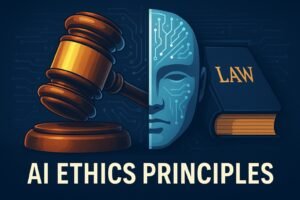What Is AI Ethics?
AI ethics principles guide responsible use of artificial intelligence while protecting fairness, transparency, and human rights. As intelligent systems become more embedded in daily decision-making, ethics are no longer abstract—they’re foundational.
These principles help maximize benefits while minimizing harms. From corporate strategies to global policy debates, AI ethics has taken center stage in 2025. With public trust in tech companies declining and high-profile AI failures making headlines, ethical frameworks are now viewed as essential infrastructure.
Global Foundation: What Are AI Ethics Principles?
AI ethics principles are the core values and standards that shape how artificial intelligence is developed and deployed. These include fairness, transparency, accountability, privacy, sustainability, and human autonomy.
According to IBM, the goal is to optimize AI’s positive potential while limiting harm. These aren’t just ideals—they’re critical in industries like healthcare, education, and finance. For instance, ethical AI ensures a medical algorithm doesn’t favor one demographic over another.
UNESCO emphasizes shared values such as beneficence, non-maleficence, and justice. As regulatory bodies catch up, these values are being codified into policy frameworks in regions from Brussels to Silicon Valley.
For a deeper breakdown of what this means for teams and leaders, read AI for Team Leaders: A New Era of Smart Leadership.
Key Trend: Personalization and Public Trust
As AI systems grow more personalized, ethical design becomes more challenging. Bias in training data can mirror societal inequities—or make them worse. A Gallup/Bentley University poll recently found that just 25% of Americans trust AI-generated content, showing how transparency failures can erode public trust.
Companies are now at a crossroads. Users want ethical, reliable systems that reflect their values. Violations don’t just cause backlash—they can sink product rollouts or trigger regulatory scrutiny.
In fact, Microsoft halted its image-generation tool earlier this year after it produced misleading outputs. That decision is a case study in how AI ethics has moved from theoretical concern to operational risk. For tips on how to improve content reliability, check out How to Bypass GPTZero Without Losing Your Voice.
Regulatory Momentum: Navigating the Frameworks
Governments and corporations alike are racing to set ethical standards. UNESCO’s global recommendation on AI ethics is one of the most ambitious, establishing shared values that cut across political and cultural divides. The European Union’s AI Act, meanwhile, introduces legally binding rules based on risk levels and data transparency.
Companies that align early with these frameworks gain more than compliance—they earn consumer trust and strategic advantage. However, critics argue that many self-regulation efforts lack real enforcement, functioning more as PR than policy.
That’s why ethical infrastructure—clear metrics, third-party audits, and open reporting—is becoming a competitive differentiator.
Cost of Ignorance: Financial and Legal Risks
Ignoring AI ethics can be costly. Microsoft’s halted rollout cost millions. Ethical lapses can trigger lawsuits, draw regulatory penalties, and destroy brand trust. In sectors like finance or healthcare, that’s not just a reputational risk—it’s a liability.
Watchdog groups and journalists are also sharpening their focus. Companies seen as ignoring public welfare or human rights in AI design may find themselves under fire.
That makes ethical design a critical part of business continuity—and in 2025, also a signal of leadership maturity. (Related: AI Ethics and Accountability: Why It Matters in 2025)
Putting Ethics Into Practice
So how are companies implementing these values? Most combine internal governance with external compliance. Ethics boards, team training, and fairness audits are becoming standard in enterprise AI teams.
Regulators, meanwhile, are setting benchmarks for things like explainability, user consent, and risk exposure. But experts warn that without meaningful tools, even the most principled frameworks can fall short.
Long term, building ethical AI will require cross-disciplinary collaboration. Engineers, policymakers, ethicists, and end users must work together to translate values into systems that are just, accountable, and resilient.
Expert Insights
“In no other field is the ethical compass more relevant than in artificial intelligence,” says UNESCO. “These general-purpose technologies are reshaping how we live. The world is changing at a pace not seen since the printing press.”
IBM adds, “AI ethics is a multidisciplinary field that studies how to optimize the beneficial impact of artificial intelligence while reducing risks and adverse outcomes.”
Frequently Asked Questions
What are the main principles of AI ethics?
Core principles include fairness, transparency, accountability, privacy, sustainability, and respect for human dignity. These values ensure AI serves the common good while upholding human rights.
Why is AI ethics important?
Because AI now influences everything from job applications to criminal sentencing. Without ethical safeguards, these systems can entrench bias and damage trust. Ethics help align innovation with real-world needs.
How are AI ethics implemented?
Through a mix of corporate governance and public regulation. That means internal audits, training, ethics boards—and external legal frameworks and enforcement.
Wrap-Up
- AI ethics principles form the foundation of trustworthy, human-centered AI
- Regulatory pressure and consumer skepticism are accelerating adoption
- Microsoft’s misstep shows how ethical lapses carry major business risk
- UNESCO and EU frameworks are setting the global tone
- Cross-disciplinary teams are the key to real implementation

